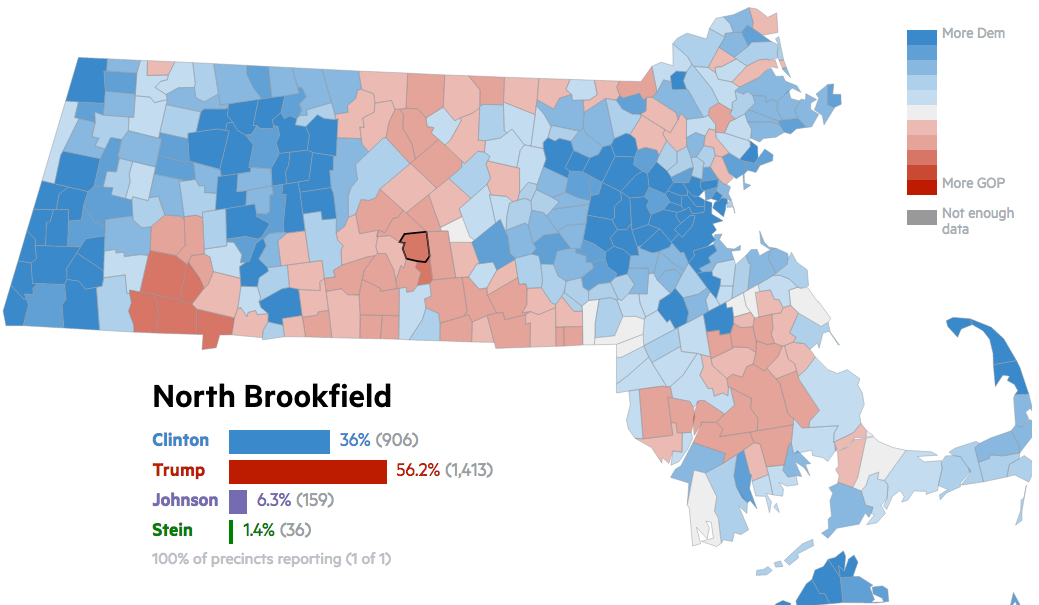|
Recently, on createquity.com, Ian David Moss wrote the following: The 2016 election laid bare not only a seething undercurrent of bigotry and xenophobia in our midst, but also just how politically and culturally segregated America has become. Are the arts part of the solution? Have they been part of the problem? We ought to find out. Yes, let's please find out. I've been thinking about this idea of cultural segregation in recent weeks. Consider my home state of Massachusetts. The 2016 election results map below tells essentially the same tale as a map of the entire nation: there is a broad band of red made up of towns in the middle of the state that I can't name and have never visited. The closest I ever get to them is when I'm whizzing by on the Mass Pike on the way to Amherst or the Berkshires. I've never met anyone from North Brookfield. Remember the rural residencies for chamber music ensembles funded by the National Endowment for the Arts? In 1992, the Ying Quartet was a poster child for this initiative, graduating from the Eastman School of Music and getting their professional career started in Jesup, Iowa. (Interestingly, Jesup is located right on the border of Buchanan and Black Hawk counties. Earlier this month, Buchanan voted for Trump while Black Hawk was one of only several counties in the entire state that went Clinton's way.) In the aftermath of the 2016 election, as we begin to learn about how divided our country has become, I wish for a way for our nation's open wound to be stitched up. Could the careful sewing of exposed flesh be accomplished with help from musicians? After all, while attempts at conversation are full of stubborn subconscious meaning-making, isn't music considered to be a universal language, transcending cultural barriers through wordless communication? Attention funders: I'm advocating for cultural diplomacy right here in Massachusetts. A granting program that encourages cultural exchanges, led by artists (with support from trained facilitators), between the state's urban and rural communities. Let's look to the arts to help us sew up the tear in our cultural fabric. Given an appropriate frame, a visceral experience with live music may be able to create the empathic space for the deep stories of our neighbors to safely emerge and be shared. Of course, when deep stories are brought to the surface, we have to be ready to respond with empathy and understanding. I believe that music may be an effective vehicle to help us get below the surface-level discourse, but who is going to help us with the challenge of continuing the conversation once it has begun? Personally, I would place my trust in the Interaction Institute for Social Change. Another challenge: a cultural exchange is a two-way street. Are we ready to be receptive to what may be shared with us? Just as receptive as we wish others to be when we share our culture with them? Our challenge awaits. How will artists contribute to affirming a shared belief in connection and inclusivity? In the words of New York Times columnist David Brooks: "The job for the rest of us is to rebind the fabric of society, community by community, and to construct a political movement for the post-Trump era."
3 Comments
Heath Marlow
11/30/2016 11:13:53 am
Response from Bob Labaree, NEC faculty:
Reply
Heath Marlow
11/30/2016 11:29:14 am
Response from Rachel Panitch, Thread Ensemble:
Reply
12/1/2016 07:08:42 am
One question that came up at a recent post-election conversation with over 100 Boston creatives was if we as artists did enough during this election (and certainly prior to the election) to have helped interfere. While we won't ever know, we can certainly look back in hindsight and realize the lost opportunities. More importantly, moving forward, this election has certainly revived artists' understanding the great power we hold in impacting social/political change (and also the huge responsibility we have to do so well). We are questioning the role of the artist and thinking, plotting, brainstorming, acting, creating in more socially-conscious ways as a result.
Reply
Your comment will be posted after it is approved.
Leave a Reply. |
AboutSharing student project documentation and, more recently, my own. Archives
June 2022
Categories |

 RSS Feed
RSS Feed
